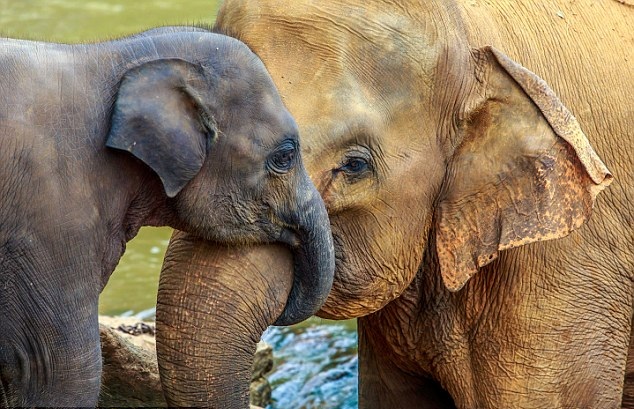Elephants have a gene that makes them virtually immune to cancer, scientists say.
Known as LIF6, the rare gene is dead and non-functioning in almost every other mammal on the planet, including humans, according to Daily Mail.
However, LIF6 is still alive and fighting cancerous mutations in elephants – giving it the nickname ‘Zombie gene’.
The life-saving LIF6 gene targets cells on the verge of mutating to become cancerous and forces them to die – saving the animal from the killer disease.
Scientists hope drugs that mimic the effect of the LIF6 gene could lead to revolutionary new treatments for human cancer patients in the future.
The more cells an animal has, the more opportunities there should be for it to develop a tumour. However, despite their size, elephants do not follow this rule.
‘Elephants get cancer far less than we’d expect based on their size, so we want to understand the genetic basis for this cancer resistance’, said lead researcher Dr Vincent Lynch, from the University of Chicago.
‘We found that elephants and their relatives have many non-functioning copies of the LIF gene, but that elephants themselves evolved a way to turn one of these copies, LIF6, back on.’
In laboratory experiments, the researchers found that when elephant cells begin ot suffer from cancer-triggering DNA damage, the potentially-fatal mutations ‘just died’
This life-saving defence system is triggered by the presence of LIF6 – one of multiple copies of the leukaemia inhibitory factor (LIF) gene.
When scientists artificially blocked LIF6 activity inside the animal, the damaged cells survived and eventually turned cancerous.
When the gene was introduced to animals that normally lack it, such as mice, they too became cancer-resistant.
LIF6 produces a protein that drills holes in mitochondria, the powerhouses of the cell. This causes the damaged cells to undergo a form of programmed suicide, known as apoptosis.
‘Hence, zombie,’ explained Dr Lynch. ‘This dead gene came back to life.
‘When it gets turned on by damaged DNA, it kills that cell, quickly.’
The gene was spurred into action by another well-known tumour-suppressing gene, p53, which itself is activated by cancer-inducing DNA damage.
The scientists now want to apply the elephant’s ability to resist cancer to human biology.
‘Maybe we can find ways of developing drugs that mimic the behaviours of the elephant’s LIF6 or of getting cancerous cells to turn on their existing zombie copies of the LIF gene,’ said Dr Lynch.
Elephants are not the only animals to have evolved a natural resistance to cancer.
Other species including whales, bats and naked mole rats are protected against cancer despite lacking LIF6.
This suggests there are ‘many ways animals can combat cancer’, said Dr Lynch.
N.H.Kh

